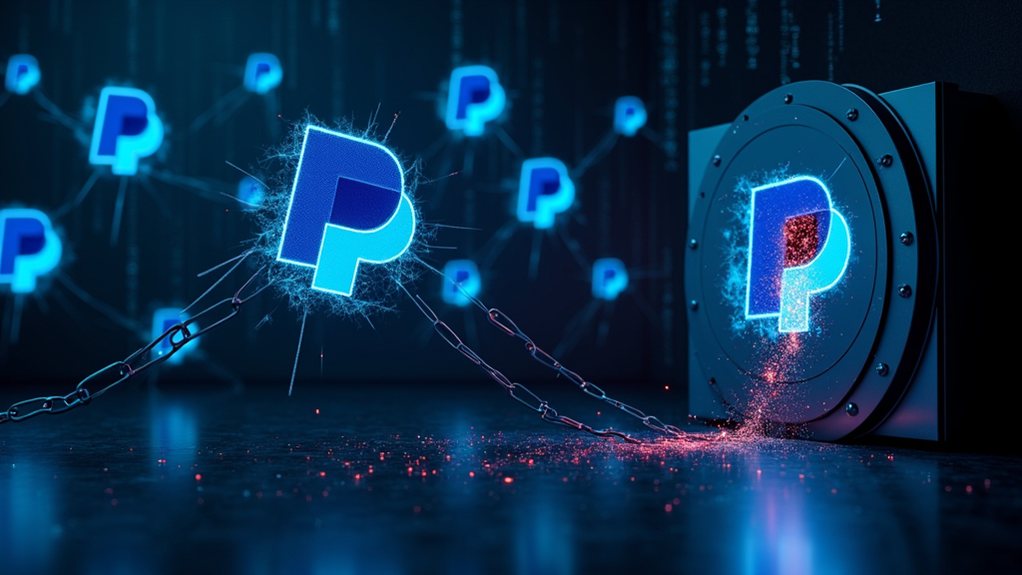16 Million PayPal Accounts Exposed Online — Why This Breach Changes Everything

16 Million PayPal Accounts Exposed: A Digital Détente? Up to 16 million PayPal accounts have hit the dark web, a staggering security breach that provides a goldmine for cybercriminals. This leak reveals a trove of plaintext passwords and associated emails, heightening fears of identity theft and fraud. Experts advise immediate password resets and adopting unique credentials. So, if your trust in online safety just plummeted, you’re not alone—the environment of digital security has irrevocably shifted. What else lurks in the shadows?
In a staggering revelation, approximately 15.8 to 16 million PayPal account credentials have allegedly leaked onto the dark web, raising alarms about the security of countless users. This massive data dump, purportedly originating from a breach that occurred in May 2025, has sent shockwaves through the tech community, igniting debates about the authenticity of the leak and the ongoing vulnerabilities in digital security protocols.
The exposed dataset includes login emails, plaintext passwords, and URLs linked to accounts worldwide. This means hackers now possess the keys to the kingdom, with plaintext passwords leaving users defenceless against automated attacks. Credential stuffing, a malicious tactic where stolen credentials are used to gain unauthorised access to accounts across multiple platforms, now has a rich new target. With many users recycling passwords, the potential for widespread identity theft and financial fraud escalates greatly. It’s like handing a thief a master key to every locked door in your neighbourhood. Experts suggest that the new dataset may be compiled using infostealer malware, which can harvest passwords and sensitive data from infected devices.
Although PayPal is quick to deny any recent breach, attributing the data to older security incidents from 2022, experts remain sceptical. After all, the last breach saw 35,000 accounts compromised and resulted in a hefty $2 million regulatory fine. If this leak is truly genuine, it could invoke even stricter scrutiny from regulators. The low selling price of the leaked credentials—just $2—raises eyebrows about the dataset’s validity. Is it a goldmine for cybercriminals or merely a hoax? Professional services like account recovery specialists can help victims regain control of compromised accounts. Regular vulnerability scanning can help identify potential security weaknesses before they’re exploited by cybercriminals.
The implications for users are dire. Security experts recommend immediate password resets and enabling multi-factor authentication to bolster defences. Users are urged to adopt unique and complex passwords, minimising the risk associated with credential reuse. With the sheer scale of exposure, the odds of encountering suspicious activity or unauthorised transactions soar. Will your PayPal account be next? The 2022 incident only exposed 35,000 accounts, making this breach far more alarming.
Immediate password resets and multi-factor authentication are crucial to protect against rising threats after the massive PayPal credential leak.
As the dust settles on this incident, the cybersecurity environment is poised for a shift. The leaked data has the potential to fuel sophisticated automated attacks, making it easier for hackers to breach defences. The presence of associated URLs provides direct access points for attackers, further enhancing their efficiency. The era of complacency in digital security may be over, as users are now on high alert, traversing a terrain fraught with danger.
Looking ahead, the real challenge lies not just in recovering from this breach, but in preventing future incidents. Calls for improved data security measures and better transparency surrounding breaches are growing louder. Users must remain vigilant, monitoring their accounts for any signs of compromise, as companies like PayPal must adapt to a new reality where trust is harder to maintain.
In a world where your digital identity is as valuable as gold, safeguarding it has never been more essential.
Final Thoughts
In a significant security breach, 16 million PayPal accounts have been compromised, underscoring the urgent need for enhanced cybersecurity measures. This situation serves as a stark reminder of the potential risks users face and the importance of proactive steps such as changing passwords and implementing two-factor authentication.
At Zoo Computer Repairs, we understand the critical nature of online security and are here to assist you in safeguarding your accounts. Our expert team can help you implement robust cybersecurity strategies tailored to your needs. Don’t wait until it’s too late—take action now to protect your digital presence.
For more information on how we can help, click on our contact us page to get in touch today!
